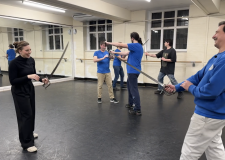University scraps short courses for Brighton and Hove people
Sussex University is blaming a lack of government funding as it scraps a series of popular evening classes and day schools.
The changes could cost the jobs of 12 academic staff and 3 support staff at Falmer. More than 120 associate tutors are also affected.
A petition has been started to try to save the short courses which are provided by the university’s Centre for Community Engagement (CCE).
Professor Michael Farthing, vice-chancellor of the university, said: “We regret that this proposal would end evening classes and day schools which have been enjoyed by local people over the years.
“However, given the government’s policies regarding the funding of higher education, the university can no longer support such courses.
“There is no public funding for non-degree courses such as these that don’t lead to qualifications and no evidence that fees can be set at a high enough level to cover their costs.
“We sadly cannot justify subsidising them from fees paid by our undergraduate and postgraduate students.”
One Brighton resident said: “Although Sussex University preach about their commitment to the local community, they are taking away any opportunity for local people to gain qualifications and improve their job prospects.
“Local people are the ones who pay their taxes to enable the universities of this country to function in the first place.
“The vice-chancellor Michael Farthing is touting for international students who pay fees of £16,000-plus.
“We must save this valuable academic route for future generations.
“Otherwise, while our international students take their degrees back to enrich their own countries, England will became a third world backwater of uneducated people, unable to obtain education at higher levels.”
The University and College Union (UCU), which is urging people to sign the petition which can be found here, said: “The management’s proposal will deprive local adult students, especially older and second chance learners, of opportunities not otherwise available to them.”
The petition said that scrapping the courses “does not reflect the university management’s often-stated commitments to community engagement, widening participation and learning opportunities outside traditional hours and locations”.
It adds: “Continuing education and community engagement have a long and illustrious history at Sussex as recognised in the 50th anniversary celebrations of the university.
“Recently the CCE has produced novelists, both amateur and professional archaeologists, supported community volunteering, put on public events, engaged with efforts to promote sign language in support of deaf communities, and engaged with teachers and young people through Creative Partnerships schemes.
“It has also provided full-time and visiting students with access to disciplines such as archaeology that are not otherwise covered by mainstream departments.
“The CCE has led the way at Sussex in terms of widening participation among non school leavers, such as ethnic and minority groups, refugees, disabled people, people from socially deprived areas and deaf communities.
“This has been achieved during the last 18 years by a range of European funding which continues to the present.
“The centre is within the successful and expanding School of Business, Management and Economics (BMEC).
“Schools are budget units at Sussex and cross-subsidise provisions within their areas.
“BMEC’s income could be used to maintain activities in the CCE.
“BMEC is financially very healthy and accepts the principle of intra-unit cross-subsidy yet this possibility is not being allowed by management.
“In addition the CCE runs the very successful International Summer School (ISS) whose significant profits could be used to help maintain CCE courses and staff.
“The decision to close all non ISS courses and the running down of the centre in recent years puts dedicated and innovative staff at risk of redundancy, that could be avoided and at a time of rising unemployment – 12 academic and academic-related staff, 3 professional support staff and 127 associate tutors are at risk.
“The management’s proposals appear to have the unintended consequence of forcing the cessation of activities which are not loss-making, because all non ISS staff are proposed for redundancy.
“Sussex UCU will be fully engaged in consultations to protect staff and students and we urge the university to explore financial opportunities such as those mentioned above for supporting the CCE, its staff and its valuable and distinctive educational and community provisions.”
The university proposes to stop offering short courses at the end of the current academic year – 2011-12.
The university said that CCE activity had already undergone significant change in recent years after the government withdrew funding for equivalent and lower qualifications (ELQs). This took away funding for anyone who already held a higher degree.
The University stopped enrolling new students in CCE degree-level programmes in 2008-09 and the last part-time cohort will finish in 2012-13.
While short courses are due to cease at the end of July 2012, the university said that it was sustaining other CCE activity where it could do so.
This would include the International Summer School and the teaching of sign language and Deaf Studies.
Allan Spencer, the university’s finance director, said: “The university receives no government or public funding for short courses.
“Together with contract work in the CCE, these courses bring in around £300,000 a year.
“But this doesn’t cover the £650,000 cost of running the courses and there is an annual deficit of around £350,000.
“Without an annual subsidy from elsewhere in the university, evening classes and day schools would require very steep rises in fees to make them cover their costs.
“This is why most other universities either do not run evening classes or have ceased to offer them in recent years.”
The university said that it was consulting with unions and staff on the implications for staffing, exploring how it could remove, reduce or ameliorate the potential loss of posts.
Twelve academic members of staff and three professional services staff in the CCE are at risk of redundancy.
There are also 127 people on hourly paid contracts who have taught for a number of hours a week for the CCE over recent years.
Not all of these people work for the CCE every year. About 50 people on these contracts have done some CCE teaching this year.
In terms of hours worked, this equated to about the equivalent of ten full-time staff in 2010-11.
The university added: “The ending of these courses will not alter the wide and significant range of other community engagement in which the university is involved across the 12 schools of studies and from its professional services.
“The CCE proposal does not relate to continuing professional development courses offered by other departments in the university nor to the open language courses offered by the Sussex Centre for Language Studies.”





















